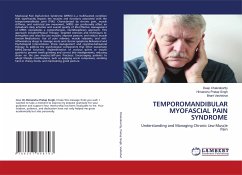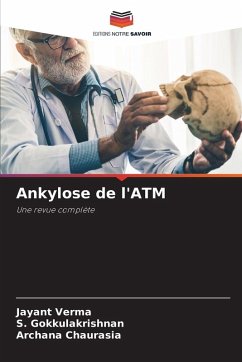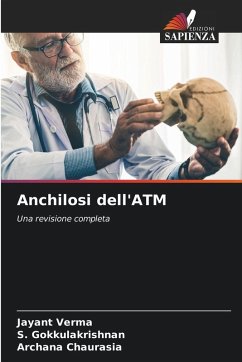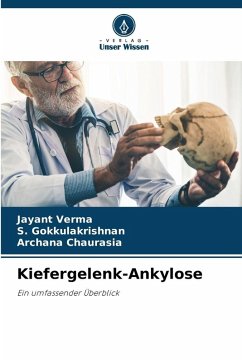
TMJ Ankylosis
A Comprehensive review
Versandkostenfrei!
Versandfertig in 6-10 Tagen
45,99 €
inkl. MwSt.

PAYBACK Punkte
23 °P sammeln!
Temporomandibular Joint (TMJ) ankylosis is a debilitating condition characterized by the fusion of the jawbone (mandible) to the temporal bone of the skull, resulting in restricted jaw movement. This condition can severely impact a person's ability to eat, speak, and maintain oral hygiene, and can also lead to facial deformities, especially in growing children. TMJ ankylosis can be classified into intra-articular (within the joint) and extra-articular (outside the joint) types. The condition arises from various etiologies, including trauma, infections, systemic diseases, and congenital factors...
Temporomandibular Joint (TMJ) ankylosis is a debilitating condition characterized by the fusion of the jawbone (mandible) to the temporal bone of the skull, resulting in restricted jaw movement. This condition can severely impact a person's ability to eat, speak, and maintain oral hygiene, and can also lead to facial deformities, especially in growing children. TMJ ankylosis can be classified into intra-articular (within the joint) and extra-articular (outside the joint) types. The condition arises from various etiologies, including trauma, infections, systemic diseases, and congenital factors.Clinical Presentation-Limited Mouth Opening: Patients typically present with a significant reduction in the ability to open their mouths, which is the hallmark of TMJ ankylosis. Pain and Discomfort: Chronic pain and discomfort in the jaw are common symptoms, although some patients may experience minimal pain despite severe restriction in movement. Difficulty in Chewing and Speaking: The reduced jaw mobility impacts mastication and articulation, leading to difficulties in eating and speaking.














